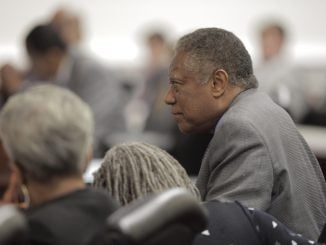
Raleigh, N.C. – On Tuesday Senate Leader Phil Berger (R-Rockingham) announced formation of the Senate Select Committee on Judicial Reform and Redistricting. The committee will debate and work on changes to the state’s judiciary and the selection of judges.
Appointed to the committee are Sen. Dan Bishop, Co-Chair; Sen. Warren Daniel, Co-Chair; Sen. Bill Rabon, Co-Chair; Sen. Dan Barrett, Sen. Dan Blue, Sen. Jay Chaudhuri, Sen. Chuck Edwards, Sen. Joel Ford, Sen. Ralph Hise, Sen. Floyd McKissick, Sen. Wesley Meredith, Sen. Paul Newton, Sen. Shirley Randleman, Sen. Norm Sanderson and Sen. Terry Van Duyn.
“After 60 years of haphazard and sometimes contradictory changes to our judicial system, I hope our state can have a thoughtful dialogue on how to modernize, reform and strengthen it in the coming months,” said Berger in a statement released on Tuesday. “The judiciary touches every North Carolinian, so the conversation needs to include Republicans and Democrats, judges, legislators, district attorneys, clerks of court, executive branch officials, men and women of all races, and, yes, even lawyers. This committee will carefully consider all options on how we select judges including the House’s judicial redistricting bill, merit selection models, retention elections, and, if we maintain a system of elections, their frequency and partisan structure.”
The announcement comes a week after the Republican-led legislature overrode Gov. Roy Cooper’s veto of Senate Bill 656, the Electoral Freedom Act of 2017. The law makes it easier to get third-party candidates on the state’s election ballots, but also cancels the 2018 judicial primaries, the main sticking point for Cooper.
Lawmakers say they want to allow newly eligible candidates to be able to get a closer look at possibly new judicial district maps or other changes that stem from the work of the new committee. The effort to update judicial district lines was launched over the summer by Rep. Justin Burr (R- Stanly), but some members of both parties say its overdue.
“The North Carolina House is carefully implementing changes to judicial districts, giving candidates for the court more certainty and fairness as they analyze changes to the elections process,” House Speaker Tim Moore (R-Kings Mountain) said in a statement after overriding the veto. “The House is responding to input from court officials by allowing judicial candidates time to fully consider the impact of potential redistricting before deciding whether or not to file.”
Senate Bill 656, the Electoral Freedom Act of 2017, says that for just the 2018 election cycle judicial candidates will run during the general election alone, with a filing period in June. It also makes it easier for a third party to be officially recognized in N.C. and reduces the number of petition signatures required for unaffiliated candidates to get on general election ballots. The measure also lowers the percentage of votes required to avoid a runoff in primaries from 40 percent to 30 percent.
Cooper and other opponents say the new law is a step toward the legislature appointing judges and limits voter access by canceling the 2018 judicial primaries.
“The legislature is angry that their bad laws continue to be overturned by the courts, and their solution to abolish a scheduled election and once again take away voters’ rights is wrong,” said Cooper in response to the override Tuesday. “This is the first step toward a constitutional amendment that will rig the system by moving to partisan, legislative selection of judges. Allowing legislators to pick their own judges for political reasons is a bad idea.”
The new committee has Republicans and Democrats and will be looking at an overhaul of how the state seats and retains judges.



